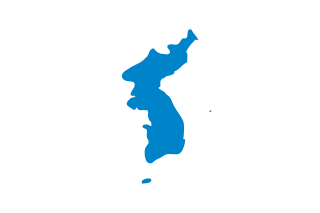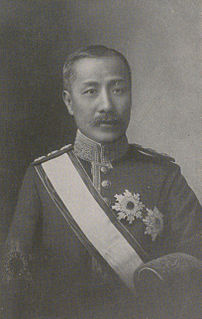Kyung-joon, also spelled Kyung-jun or Kyoung-jun, is a Korean masculine given name. Its meaning differs based on the hanja used to write each syllable of the name. There are 54 hanja with the reading kyung and 34 hanja with the reading "joon" on the South Korean government's official list of hanja which may be registered for use in given names.
Joon-ho, also spelled Jun-ho, is a Korean given name, that is a masculine name. The meaning differs based on the hanja used to write the name. There are 34 hanja with the reading "joon" and 49 hanja with the reading "ho" on the South Korean government's official list of hanja which may be used in given names. Joon-ho was a popular name for baby boys in South Korea for several decades, coming in sixth place in 1970, rising to fourth place in 1980, and falling to seventh place in 1990.
Hyun-jun, also spelled Hyun-joon, is a Korean masculine given name. Its meaning differs based on the hanja used to write each syllable of the name. There are 31 hanja with the reading "hyun" and 34 hanja with the reading "jun" on the South Korean government's official list of hanja which may be used in given names. In 2008 and 2009 it was the eighth-most popular name for newborn boys in South Korea, with 1,636 being given the name in 2008 and 1,681 in 2009.
Jun-young, also spelled Joon-young, is a Korean masculine given name. It was the tenth-most popular name for baby boys in South Korea in 1980, rising to sixth place by 1990. Its meaning depends on the hanja used to write each syllable of the name. There are 34 hanja with the reading "jun" and 34 hanja with the reading "young" on the South Korean government's official list of hanja which may be registered for use in given names.
Byung-chul is a Korean masculine given name. Its meaning differs based on the hanja used to write each syllable of the name. There are 17 hanja with the reading "byung" and 11 hanja with the reading "chul" on the South Korean government's official list of hanja which may be used in given names. It was the eighth-most popular name for baby boys born in South Korea in 1950.
Yong-joon, also spelled Yong-jun, is a Korean masculine given name. There are 24 hanja with the reading "yong" and 34 hanja with the reading "joon" on the South Korean government's official list of hanja which may be used in given names. Additionally, names written with the character for "dragon" (龍) may be spelled as Ryong-jun or Ryong-joon, particularly in North Korea.
Byung-ho, also spelled Byong-ho or Pyong-ho, is a Korean masculine given name. The meaning differs based on the hanja used to write each syllable of the name. There are 17 hanja with the reading "byung" and 49 hanja with the reading "ho" on the South Korean government's official list of hanja which may be used in given names. According to South Korean government data, Byung-ho was the third-most popular name for baby boys in 1940.
Hyung-joon, also spelled Hyung-jun or Hyong-jun, is a Korean masculine given name. Its meaning differs based on the hanja used to write each syllable of the name. There are 21 hanja with the reading "hyung" and 34 hanja with the reading "joon" on the South Korean government's official list of hanja which may be registered for use in given names.
Joon-hee, also spelled Jun-hee, is a Korean unisex given name. Its meaning differs based on the hanja used to write each syllable of the name. There are 34 hanja with the reading "joon" and 24 hanja with the reading "hee" on the South Korean government's official list of hanja which may be registered for use in given names.
Dong-jun, also spelled Dong-joon, is a Korean masculine given name. Its meaning differs based on the hanja used to write each syllable of the name. There are 24 hanja with the reading "dong" and 34 hanja with the reading "joon" on the South Korean government's official list of hanja which may be registered for use in given names.
Byung-hee is a Korean unisex given name. Its meaning depends on the hanja used to write each syllable of the name. There are 17 hanja with the reading "byung" and 24 hanja with the reading "hee" on the South Korean government's official list of hanja which may be used in given names.
Byung-hun, also spelled Byung-heon, is a Korean masculine given name. Its meaning depends on the hanja used to write each syllable of the name. There are 17 hanja with the reading "byung" and seven hanja with the reading "hun" on the South Korean government's official list of hanja which may be used in given names.
Ho-jun, also spelled Ho-joon, is a Korean masculine given name. Its meaning differs based on the hanja used to write each syllable of the name. There are 49 hanja with the reading "ho" and 34 hanja with the reading "jun" on the South Korean government's official list of hanja which may be registered for use in given names.
Joon-ki, also spelled Joon-gi, is a Korean masculine given name. Its meaning differs based on the hanja used to write each syllable of the name. There are 34 hanja with the reading "joon" and 68 hanja with the reading "ki" on the South Korean government's official list of hanja which may be registered for use in given names.
Byung-wook is a Korean masculine given name. Its meaning depends on the hanja used to write each syllable of the name. There are 17 hanja with the reading "byung" and 11 hanja with the reading "wook" on the South Korean government's official list of hanja which may be registered for use in given names.
Yeong-jun, also spelled Yeong-joon, Young-jun, Young-joon, or in North Korea Yong-jun, is a Korean masculine given name. Its meaning differs based on the hanja used to write each syllable of the name. There are 34 hanja with the reading "yeong" and 34 hanja with the reading "jun" on the South Korean government's official list of hanja which may be registered for use in given names.
Yeong-ok, also spelled Young-ok or Yong-ok, is a Korean feminine given name. Its meaning differs based on the hanja used to write each syllable of the name. There are 34 hanja with the reading "yeong" and five hanja with the reading "ok" on the South Korean government's official list of hanja which may be registered for use in given names.
Myung-jun, also spelled Myeong-jun or Myŏng-jun, is a Korean masculine given name. Its meaning differs based on the hanja used to write each syllable of the name. There are 19 hanja with the reading "myung" and 34 hanja with the reading "jun" on the South Korean government's official list of hanja which may be registered for use in given names. People with this name include:
Kim Byeong-jun (김병준) or Kim Pyŏng-jun may refer to:

